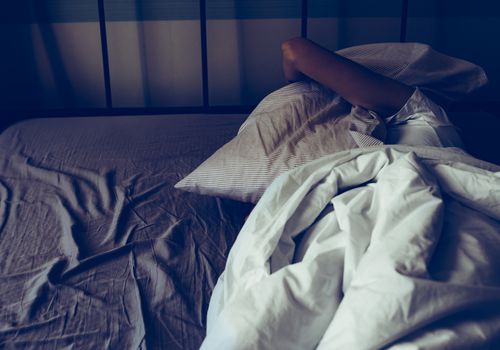In a pair of recent papers, Columbia researchers and their collaborators have quantified the effect of the COVID pandemic on health care workers’ sleep patterns and the potentially damaging consequences of sleep disturbance on their mental health.
The newest paper, published Nov. 24, finds that health care workers with poor sleep were twice as likely to report symptoms of depression than their better-rested colleagues and were 50% more likely to report psychological distress and 70% more likely to report anxiety.
That constellation of troubles could worsen the overlapping crises already enveloping health care. “Right now, a large percentage of health care workers are leaving their jobs because of the stress, producing a shortage of health care workers nationally,” says the studies’ lead author Marwah Abdalla, MD, assistant professor of medicine at Columbia University Vagelos College of Physicians and Surgeons. “With fewer workers on the job, the remaining staff must work more and longer shifts, exacerbating their sleep problems and stress.”
It’s hardly news that health care workers have been under immense stress during the COVID pandemic, something Abdalla, a cardiologist at Columbia University Irving Medical Center, has witnessed firsthand since early 2020. As a physician-scientist, she formed a team to study health care workers’ reactions to the stress, with a special emphasis on the pandemic’s effects on sleep.
During the pandemic’s first peak in New York City, she and her colleagues conducted a series of surveys of health care workers’ sleep habits and psychological symptoms. The group’s first paper, published in August, summarized the sleep data, showing that over 70% of health care workers had at least moderate insomnia symptoms during the pandemic’s first peak. Though that number declined alongside COVID case counts, nearly four in 10 still suffered from insomnia symptoms 10 weeks later when the first COVID wave was over and work schedules had returned to more normal levels.
Poor sleep not only affects patient care—”We know that lack of sleep degrades quality of care for our patients and can increase medical errors,” says Abdalla—but also may also trigger symptoms of depression and anxiety.
In the second study, the researchers found that health care workers who reported poor sleep also reported higher levels of stress, anxiety, and depression than health care workers who slept better.
Although stress, anxiety, and depression can arise among well-rested individuals, “sleep is essential to mental health and there is a bidirectional relationship,” Abdalla says. “While we don’t know from this study if psychological distress itself caused poor sleep or if poor sleep resulted in psychological distress among these health care workers, improving sleep can reduce psychological problems and vice versa.”
Abdalla adds that if future studies can tease apart the direction of this relationship and the impact of poor sleep on mental health for health care workers during the pandemic, there may be several potential interventions, from cognitive-behavioral therapy for insomnia to increasing break room rest areas, and/or installing nap pods for hospital staff to use during long shifts. “For people who might be sleep deprived, encourage them to go and lie down for 20 minutes or 30 minutes,” Abdalla says.
Improved sleep won’t alleviate all the extra stress that health care workers face but may help to improve mental and physical health.
“Previous research has shown that sleep trouble increases your risk for chronic conditions such as heart disease, diabetes, dementia, and cancer,” says Abdalla. “If you have trouble sleeping, let this be a wake-up call.”








